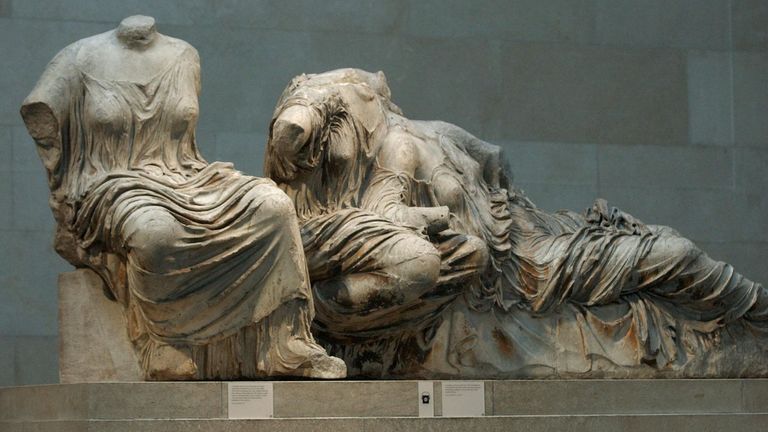Downing Street has said the future of the Elgin Marbles is a matter for the British Museum, as Sir Keir Starmer met Greek Prime Minister Kyriakos Mitsotakis.
But there was no mention of the ancient Parthenon sculptures during the meeting.
It comes as The Times reported the meeting between the two leaders was organised due to progress in negotiations for a potential deal that could see the sculptures returned to Greece.

But Downing Street insisted discussions about the marbles were not on Sir Keir's meeting agenda.
It said the government had "no plans to change the law that would permit a permanent move and that the case of decisions relating to the care and management and sculptures are a matter for the trustees of the British Museum, which is operationally independent of the government".
Asked if it would be possible to loan the Elgin Marbles to Athens, the spokesman said: "Those decisions are entirely for the British Museum."
Discussions about a cultural "Parthenon Partnership" are "ongoing and constructive", according to the museum.
The partnership would likely be at the heart of a deal between the museum and the Greek government, which could see the sculptures returned to Athens in exchange for exhibitions of famous artworks.

A spokesperson for the British Museum added: "We believe that this kind of long-term partnership would strike the right balance between sharing our greatest objects with audiences around the world, and maintaining the integrity of the incredible collection we hold at the museum."
Tuesday's visit was the first the Greek leader has made to the UK since a diplomatic row was sparked under the previous government.
Read more:
What are the Elgin Marbles and how did they end up in Britain?
Then-prime minister Rishi Sunak cancelled a meeting with Mr Mitsotakis, who had pushed for the sculptures' return.
Mr Sunak denied having thrown a "hissy fit" over the matter and accused his counterpart of grandstanding.
Mr Mitsotakis had compared splitting the Elgin Marbles from those still in Athens to cutting the Mona Lisa in half.
Greece has long maintained that the Elgin Marbles were illegally removed from their place high atop Athens' acropolis during a period of foreign occupation.
Please use Chrome browser for a more accessible video player
The marble statues came from friezes on the 2,500-year-old Parthenon temple and have been displayed at the British Museum for more than 200 years.
They were removed by Lord Elgin in the early 19th century when he was British ambassador to the Ottoman Empire.
Actor Stephen Fry told Sky News the marbles "belong in Athens", and he insists that would be a win-win for both countries involved.
"Pride on both sides will be increased," he told Kay Burley.
"Obviously for the Greeks to have the unification of these fantastically sacred pieces, and for Britain our reputation - it will enhance it.
"We'll be seen to have done something rather classy."
But shadow culture minister Saqib Bhatti added: "The marbles are protected by an act of Parliament - the PM needs to be clear that he will not allow the law to be changed and block any legal work around that might be devised to allow them to be taken out of this country.
"The prime minister should be standing up for Britain, our heritage, and our world-class cultural institutions instead of giving in to pressure from campaigners who detest British history."

 16 hours ago
1
16 hours ago
1









 English (US)
English (US)